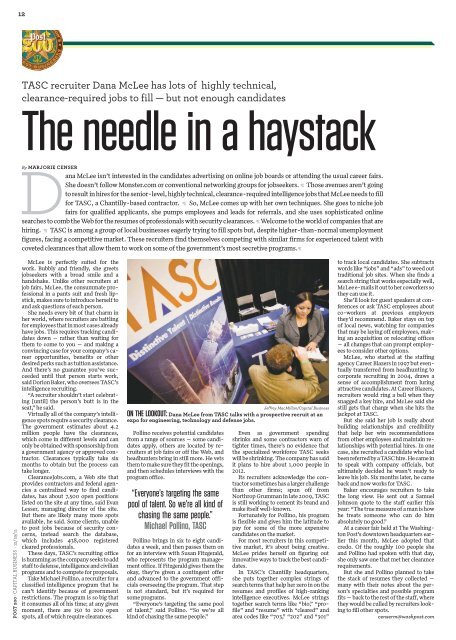The slow build - Express
The slow build - Express
The slow build - Express
Create successful ePaper yourself
Turn your PDF publications into a flip-book with our unique Google optimized e-Paper software.
TASC recruiter Dana McLee has lots of highly technical,<br />
clearance-required jobs to fill — but not enough candidates<br />
<strong>The</strong> needle in a haystack<br />
By MARJORIE CENSER<br />
Dana McLee isn’t interested in the candidates advertising on online job boards or attending the usual career fairs.<br />
She doesn’t follow Monster.com or conventional networking groups for jobseekers. Those avenues aren’t going<br />
to result in hires for the senior-level, highly technical, clearance-required intelligence jobs that McLee needs to fill<br />
for TASC, a Chantilly-based contractor. So, McLee comes up with her own techniques. She goes to niche job<br />
fairs for qualified applicants, she pumps employees and leads for referrals, and she uses sophisticated online<br />
searches to comb the Web for the resumes of professionals with security clearances. Welcome to the world of companies that are<br />
hiring. TASC is among a group of local businesses eagerly trying to fill spots but, despite higher-than-normal unemployment<br />
figures, facing a competitive market. <strong>The</strong>se recruiters find themselves competing with similar firms for experienced talent with<br />
coveted clearances that allow them to work on some of the government’s most secretive programs.<br />
McLee is perfectly suited for the<br />
work. Bubbly and friendly, she greets<br />
jobseekers with a broad smile and a<br />
handshake. Unlike other recruiters at<br />
job fairs, McLee, the consummate professional<br />
in a pants suit and fresh lipstick,<br />
makes sure to introduce herself to<br />
and ask questions of each person.<br />
She needs every bit of that charm in<br />
her world, where recruiters are battling<br />
for employees that in most cases already<br />
have jobs. This requires tracking candidates<br />
down — rather than waiting for<br />
them to come to you — and making a<br />
convincing case for your company’s career<br />
opportunities, benefits or other<br />
desired perks such as tuition assistance.<br />
And there’s no guarantee you’ve succeeded<br />
until that person starts work,<br />
said Dorion Baker, who oversees TASC’s<br />
intelligence recruiting.<br />
“A recruiter shouldn’t start celebrating<br />
[until] the person’s butt is in the<br />
seat,” he said.<br />
Virtually all of the company’s intelligence<br />
spots require a security clearance.<br />
<strong>The</strong> government estimates about 4.2<br />
million people have the clearances,<br />
which come in different levels and can<br />
only be obtained with sponsorship from<br />
a government agency or approved contractor.<br />
Clearances typically take six<br />
months to obtain but the process can<br />
take longer.<br />
ClearanceJobs.com, a Web site that<br />
provides contractors and federal agencies<br />
a centralized way to find candidates,<br />
has about 7,500 open positions<br />
listed on the site at any time, said Evan<br />
Lesser, managing director of the site.<br />
But there are likely many more spots<br />
available, he said. Some clients, unable<br />
to post jobs because of security concerns,<br />
instead search the database,<br />
which includes 438,000 registered<br />
cleared professionals.<br />
<strong>The</strong>se days, TASC’s recruiting office<br />
is humming as the company seeks to add<br />
staff to defense, intelligence and civilian<br />
programs and to compete for proposals.<br />
Take Michael Pollino, a recruiter for a<br />
classified intelligence program that he<br />
can’t identify because of government<br />
restrictions. <strong>The</strong> program is so big that<br />
it consumes all of his time; at any given<br />
moment, there are 150 to 200 open<br />
spots, all of which require clearances.<br />
POST 200. CAPITAL BUSINESS . 12/19/11 12<br />
Jeffrey MacMillan/Capital Business<br />
ON THE LOOKOUT: Dana McLee from TASC talks with a prospective recruit at an<br />
expo for engineering, technology and defense jobs.<br />
Pollino receives potential candidates<br />
from a range of sources — some candidates<br />
apply, others are located by recruiters<br />
at job fairs or off the Web, and<br />
headhunters bring in still more. He vets<br />
them to make sure they fit the openings,<br />
and then schedules interviews with the<br />
program office.<br />
“Everyone’s targeting the same<br />
pool of talent. So we’re all kind of<br />
chasing the same people.”<br />
Michael Pollino, TASC<br />
Pollino brings in six to eight candidates<br />
a week, and then passes them on<br />
for an interview with Susan Fitzgerald,<br />
who represents the program management<br />
office. If Fitzgerald gives them the<br />
okay, they’re given a contingent offer<br />
and advanced to the government officials<br />
overseeing the program. That step<br />
is not standard, but it’s required for<br />
some programs.<br />
“Everyone’s targeting the same pool<br />
of talent,” said Pollino. “So we’re all<br />
kind of chasing the same people.”<br />
Even as government spending<br />
shrinks and some contractors warn of<br />
tighter times, there’s no evidence that<br />
the specialized workforce TASC seeks<br />
will be shrinking. <strong>The</strong> company has said<br />
it plans to hire about 1,000 people in<br />
2012.<br />
Its recruiters acknowledge the contractor<br />
sometimes has a larger challenge<br />
than other firms; spun off from<br />
Northrop Grumman in late 2009, TASC<br />
is still working to cement its brand and<br />
make itself well-known.<br />
Fortunately for Pollino, his program<br />
is flexible and gives him the latitude to<br />
pay for some of the more expensive<br />
candidates on the market.<br />
For most recruiters in this competitive<br />
market, it’s about being creative.<br />
McLee prides herself on figuring out<br />
innovative ways to track the best candidates.<br />
In TASC’s Chantilly headquarters,<br />
she puts together complex strings of<br />
search terms that help her zero in on the<br />
resumes and profiles of high-ranking<br />
intelligence executives. McLee strings<br />
together search terms like “bio,” “profile”<br />
and “resume” with “cleared” and<br />
area codes like “703,” “202” and “301”<br />
to track local candidates. She subtracts<br />
words like “jobs” and “ads” to weed out<br />
traditional job sites. When she finds a<br />
search string that works especially well,<br />
McLee e-mails it out to her coworkers so<br />
they can use it.<br />
She’ll look for guest speakers at conferences<br />
or ask TASC employees about<br />
co-workers at previous employers<br />
they’d recommend. Baker stays on top<br />
of local news, watching for companies<br />
that may be laying off employees, making<br />
an acquisition or relocating offices<br />
— all changes that can prompt employees<br />
to consider other options.<br />
McLee, who started at the staffing<br />
agency Career Blazers in 1997 but eventually<br />
transferred from headhunting to<br />
corporate recruiting in 2004, draws a<br />
sense of accomplishment from luring<br />
attractive candidates. At Career Blazers,<br />
recruiters would ring a bell when they<br />
snagged a key hire, and McLee said she<br />
still gets that charge when she hits the<br />
jackpot at TASC.<br />
But she said her job is really about<br />
<strong>build</strong>ing relationships and credibility<br />
that help her win recommendations<br />
from other employees and maintain relationships<br />
with potential hires. In one<br />
case, she recruited a candidate who had<br />
been referred by a TASC hire. He came in<br />
to speak with company officials, but<br />
ultimately decided he wasn’t ready to<br />
leave his job. Six months later, he came<br />
back and now works for TASC.<br />
Baker encourages recruiters to take<br />
the long view. He sent out a Samuel<br />
Johnson quote to the staff earlier this<br />
year: “<strong>The</strong> true measure of a man is how<br />
he treats someone who can do him<br />
absolutely no good.”<br />
At a career fair held at <strong>The</strong> Washington<br />
Post’s downtown headquarters earlier<br />
this month, McLee adopted that<br />
credo. Of the roughly 100 people she<br />
and Pollino had spoken with that day,<br />
she only saw one that met her clearance<br />
requirements.<br />
But she and Pollino planned to take<br />
the stack of resumes they collected —<br />
many with their notes about the person’s<br />
specialties and possible program<br />
fits — back to the rest of the staff, where<br />
they would be culled by recruiters looking<br />
to fill other spots.<br />
censerm@washpost.com








![kd]ho \eh ]_\ji5](https://img.yumpu.com/10524764/1/190x224/kdho-eh-ji5.jpg?quality=85)

![4eXST]RT >U BdXRXST 8] 1[Pbcb - Express](https://img.yumpu.com/6751519/1/190x224/4exstrt-u-bdxrxst-8-1pbcb-express.jpg?quality=85)


